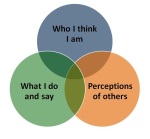In this last post on Personal Brand, I want to address the most difficult circle for many (most?) of us – the perceptions that others have of us. In marketing terms, let’s call this our “Market”.
Do you remember the old Burger Chef fast food chain? Growing up, we called it the “Barf-n-Choke”. Can you tell what our perception of Burger Chef was? Does it exist today? Not here in NE Indiana. The Market decided what it thought of Burger Chef with its feet – they left.
As you consider how to strengthen your personal brand, you are forced to seriously consider the perceptions others have of you. This area is the most difficult for me. Part of me wants to act like Clint Eastwood in “High Plains Drifter” and just jump on my horse and ride – and occasionally shoot bad guys. But if I’m serious about my personal brand, I have to pay attention to this area of my life. So, I’m dismounting…
As I see it, perceptions can come from 3 primary groups of people: Haters, the Herd, and Helpers. Let me explain what I mean.
HATERS
I know this term seems harsh, but I wanted another “H” word. But you already get the drift of what I’m going to say about them. These are people who judge first and don’t ask questions. They are a small group of people who delight when someone fails. They don’t see the good in others. They put others down in an attempt to lift themselves up.
Secret: Whatever a “hater” throws your way, find the truth quickly in what they are saying, use that to strengthen yourself, then avoid/ignore them. Don’t get caught up in senseless arguments with them. They revel in this. If need be, agree to disagree. Don’t waste personal energy obsessing with trying to convince them to change their opinion.
For some folks, they place a large price tag on cutting others down and have a very, very tiny price tag on love and cooperation. Don’t let them put that big, ugly price tag on you. You’re worth more than that!
Another secret: If you find yourself feeling hurt over and over again by a “hater”, you have a choice in how you handle this. A counselor friend of mine once told me this – you can do one of three things:
- Rehearse It – play those hurtful “tapes” over and over in your mind. It will only further damage your confidence and self-worth. Don’t do it!
- Nurse It – have a perpetual pity party. Don’t you just love to be around a person like this? No? Then don’t be that person. Say what my older sister says…”I’m over it!”
- Reverse It – OK, so something bad happened. Maybe you played a part in it or not. Let it go and move on. Learn from it. Become better for it. “Repent” from it (yeah, I wrote repent = to turn around, do a 180 and walk away from something).
HERD
This is the largest group of people you encounter every day. It’s the barista at your favorite coffee shop. It’s the co-workers you pass on the way to your office. It’s the other parents at your daughter’s dance studio or son’s baseball team. It’s folks you attend church with. It’s your neighbors. It’s your vendors.
Do you know what general impression they have of you? Here’s another question to ask yourself:
What do you want people to think about you 5 minutes after you’ve left their presence?
This question comes to the core of an idea that author Peter Bregman wrote about in his book, 18 Minutes. In one of the chapters, he writes that too often that we have an event happen in our lives (i.e. interaction with someone). “It” happens and we then react to it – good or bad. Bregman encourages us to change the order of this, or as Covey wrote, “keep the end in mind.”
EVENT –> OUTCOME –> RESPONSE
How do you want an interaction to end? Think about what this person who just dumped something on you will think about you 5 minutes after you’ve walked away? Now respond. That can make a difference, right?
You want to keep moving your Herd towards the next group…
HELPERS
Helpers are those folks in our lives who we trust. They can know us best. They will be fearlessly honest with us – yes, love hurts sometimes. They hold us accountable. They don’t judge…they critique. They build up. They expect the best from themselves and those around them.
In marketing terms, Helpers are our Net Promoters. We need more Helpers in our lives.
Some key points as we conclude:
- Think of your Herd and Helpers as “buyers” of your personal brand. You need buyers. Concentrate most of your emotional energy on them. Learn from them. Become better because of them.
- Don’t believe all of your good or bad press!
- Truth is probably somewhere in the middle.
How’s your personal brand looking these days? Are people “buying” you? Are you proud of your brand? Need to strengthen it? Try focusing on the 3 circles and see what happens.
I hope you sell-out…to a better, improved you!
Thanks for visiting and reading! I appreciate it! JJ









